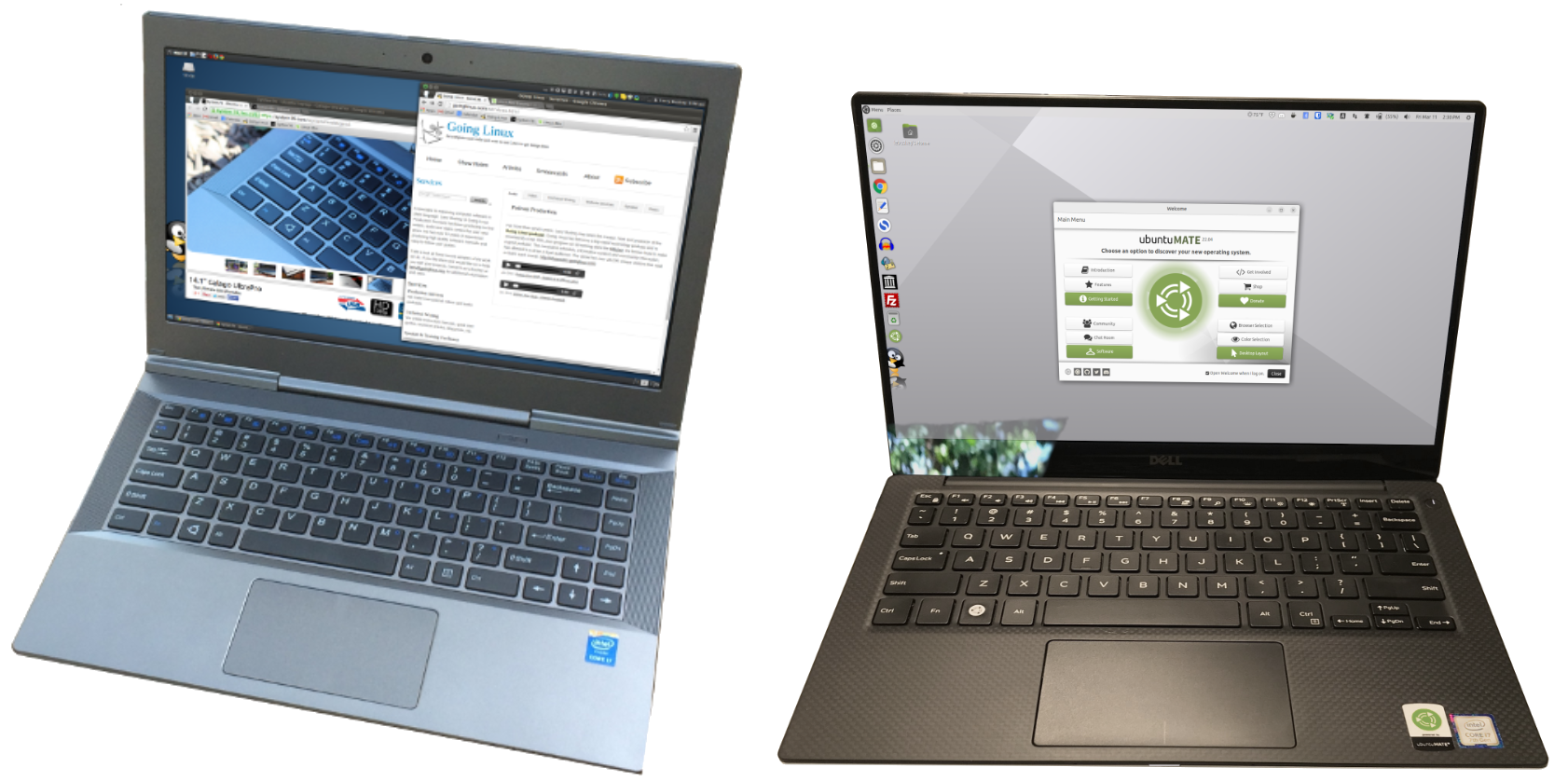The Advantages of Computer Hardware Designed For Linux
Apple was right! Everything just works when a computer's hardware and software are designed to work together.
Over four years ago, I made the decision to upgrade my trusty 14.1" HP Pavilion dm4-1063cl notebook by maxing-out the RAM to 8GB and replacing the 500GB spinning drive with a 512GB SSD. Although it would not have the long battery life of the newest ultrabooks from back then, the upgrades were significantly more economical, the SSD was reliable and fast, and I got almost a full four years of use out of the old HP. In 2017, the time had come to finally replace it.
The Magic When Computer Hardware and Operating System are Made for Each Other
Having made the decision to buy a new ultrabook, I knew that I wanted to buy from a computer vendor that pre-installs Linux. I chose the 14.1" Galago UltraPro from System76. I also knew that buying from a company like System76, Zareason, or the Dell Developer Edition would provide me with hardware that is guaranteed to run Linux. Although the folks at System76 don't manufacture all of their computers, they do select the models and components to ensure Linux compatibility. What I didn't know is how much of a difference that makes! I used my new ultrabook for quite a few years, and before I replaced it with a Dell XPS 13, I came to realize within the first couple of weeks of using a laptop built for Linux that the "magic" that Apple credits with making all of its products "just work" together, is real -- and it's not available only from Apple. When you use hardware that is made for Linux, everything just works! No need to mess with finding the right drivers. No need to worry that the display might need a tweak to get it working. No need to mess with the sound card or any other component. The advantages of having hardware and software that are designed for each other works for Linux computers just as it does for Apple devices.

The Reason Windows Is Pre-Installed
I don't know if it started in the "good old days" when IBM allowed the creation of generic PC clones. But today's reality is that when designing their software, the folks at Microsoft have to consider compatibility with dozens, if not hundreds, and in some cases maybe even thousands of possible vendors of any particular computer component. On the plus side, this reality has created a market with a wide selection of models, ranging from inexpensive, under powered netbooks to screaming liquid-cooled gaming-optimized super computers. It has also made it extremely difficult, if not impossible for the Windows operating system and Windows applications to be written to ensure perfect operation on each and every possible computer model.
There is a reason that Windows comes pre-installed when you buy a computer from Acer, Asus, Dell, HP, Lenovo, Samsung, Toshiba and hundreds of other manufacturers. It takes a long time to find and configure exactly the right drivers, tweak the display settings, work out the kinks in networking, configure the wifi settings, apply the patch that works around that bug in the wifi card that the guys in marketing insisted on using, and on and on...
The Reason macOS Is Pre-Installed
Apple, on the other hand, put a stop to the selling of generic Mac hardware many years ago. This has resulted in a limited selection of vendors that are approved to produce the hardware that makes it onto Apple's short list. For developers, this means that Apple's operating system and application software can be written without the need to consider hardware outside of that list. Software creators know that there are only a certain number of hard drives, RAM chips, display drivers, screen resolutions, processors, network cards, power supplies and other hardware components. As a result, they have a finite list of hardware to test their software against, in an effort to ensure that it works flawlessly.
There is a reason, when you buy a computer from Apple, that macOS is pre-installed. And it's different from the Windows reason. MacOS is what the hardware is designed to run!
The Reason To Get Linux Pre-Installed
When you buy a computer with Linux pre-installed, like when you buy from Apple, you can be sure that the hardware works beautifully with your chosen operating system. OK, so the hardware may not have been designed specifically to run Linux, but the computer vendor has chosen that hardware specifically because it DOES work well with Linux -- any Linux!
You can install Linux on almost any computer hardware -- Mac or Windows PC. There is a reason, when you buy a computer to run Linux, that you should get one with Linux pre-installed. It's because you can be sure you'll have the "just works" experience with whatever version of Linux you choose to install in the future. And... since Linux is safer than other operating systems, you can be sure that you are as secure as possible on-line and off.
As for me, my Dell XPS-13 now runs Ubuntu Cinnamon 24.04 LTS. And I installed it knowing that all of the hardware would "just work!" Thanks Dell.
Where To Buy Computers With Linux Pre-Installed
If you want a laptop guaranteed to run Linux, purchase a computer with Linux pre-installed. You can get these from System76, Framework, Dell, or Linux Certified. If you want to broaden your selection, and install Linux yourself, and still get the best performance at the highest quality and guaranteed to run Linux, look at the Ubuntu Certified Hardware list or similar published lists.
Not in the US? Try a model from Tuxedo in Germany, Tuxedo Notebooks.
Or UK-based Entroware provides a range of desktops, laptops and servers pre-installed with Ubuntu. Of course there are other options as well.
If you want an additional recommendation, here is an audio review of the XPS model from Knightwise: KW1006 Reviewing the Dell XPS 13
(This article has been edited in 2024 to update some of the references and details.)

